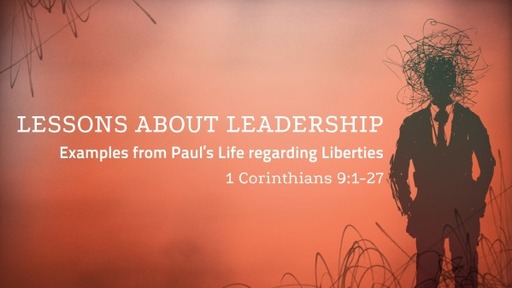Lessons about Leadership (Part 1)

Intro:
I. Paul’s Rights (v.1-14)
Examine (anakrinō) was a legal term for the investigation or inquiry made before a decision was reached in a case. He desires to clearly defend his rights.
(I)A. Right to Eat & Drink (v.4)
(I)B. Right to Take Along a Believing Wife (v.5)
(I)C. Right to be Supported Financially (v.6-14)
The sense is, ‘Why should I and Barnabas be regarded as having no right to support? Have we been less faithful than others? Have we done less? Have we given fewer evidences that we are sent by the Lord, or that God approves us in our work? Have we been less successful? Why then should we be singled out; and why should it be supposed that we are obliged to labour for our support? Is there no other conceivable reason why we should support ourselves than a consciousness that we have no right to support from the people with whom we labour?” It is evident from ver. 12, that Barnabas as well as Paul relinquished his right to a support, and laboured to maintain himself.
1. It’s Customary in Nature: (v. 7)
2. It’s God’s Law (v. 8-11)
The Lord’s servants deserve to be supported well. There should not be a double standard, applying to preachers, missionaries, and other Christian ministers a standard that is considerably lower than that set for those laboring in the system of man.
Giving to the Lord’s workers is giving to the Lord. God gives to His children beyond measure, so that, as Paul had already reminded the Corinthians, we “are not lacking in any gift” (1 Cor. 1:7). Peter tells us that “His divine power has granted to us everything pertaining to life and godliness” (2 Pet. 1:3). God supplies all our “needs according to His riches in glory in Christ Jesus” (Phil. 4:19). God’s children are to reflect their heavenly Father’s generosity. “He who sows sparingly shall also reap sparingly; and he who sows bountifully shall also reap bountifully” (2 Cor. 9:6). As individuals and as churches, Christians who give generously to the Lord’s work and to the support of His servants will be blessed.
3. It’s Being Done for Others (v.12)
4. It’s the OT Practice (v.13)
5. It’s Christ’s Own Words (v. 14)
The secret of the power and influence of the leaders of the first-century church wasn’t just in the things they said but the fact that they were themselves an incarnation of their own message.
